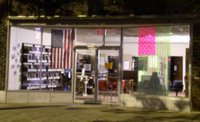I received a call from Sara Pasti on Wedsnesday informing me that the Library Board voted - unanimously - to have the flag remove by this coming Friday. Up to this point, I think the library has handled the controversy well, and has supported the principle behind displaying the artwork. The Windows on Main St. project relies on the hospitality of local businesses and institutions to host the installations created by the participating artists, and if an establishment chooses for some reason to have the artwork removed, we as organizers, and our sponsor, BACA accept that as an establishment's perogative, and we will honor such wishes if they occur. We are grateful to all of our participating businesses. The library in particular has been very enthusiastic in both this and last year's project, and has expressed interest in participating next year, and we welcome them. I am disappointed by the decision, and I figure it's a way for the library to save face in a way that, while the removal of the piece will occur just a couple of days short of the full term of the exhibit which is scheduled to end on Sept. 10, it should placate a very vocal demographic.
I honor the opinions of those who have voiced opposition to this artwork, but I certainly disagree with their position. This particular instance is a specific flash point of debate, but it speaks to a current of underlying issues that have formed with the influx of new residents to Beacon, and the changes it affects. I think moments like this can bring these issues to the front, potentially bearing positive results ...or they can go the other way. I'll hope for the former, not the latter.

On my way home Wednesday night, I saw that an actual American flag had been placed in the window, hanging in the same manner as Elia's piece, just a little smaller. I'm not sure what to think of it, except that with the opportunity to compare/contrast the two emblems in question, I feel it further illustrates the distinction between the actual item and the actualization of a poetic concept. I think this "side by side" setup inadvertantly serves to demonstrate the true and significant distance between Elia's artistic exploration, and a desecration of the nation's flag.
I expect there will be more comments on this topic, and I'll pass them along as I recieve them.
The text of "I hear America Singing" by Walt Whitman:
I hear America singing, the varied carols I hear;
Those of mechanics—each one singing his, as it should be, blithe and strong;
The carpenter singing his, as he measures his plank or beam,
The mason singing his, as he makes ready for work, or leaves off work;
The boatman singing what belongs to him in his boat—the deckhand singing on the steamboat deck;
The shoemaker singing as he sits on his bench—the hatter singing as he stands;
The wood-cutter’s song—the ploughboy’s, on his way in the morning, or at the noon intermission, or at sundown;
The delicious singing of the mother—or of the young wife at work—or of the girl sewing or washing—Each singing what belongs to her, and to none else;
The day what belongs to the day—At night, the party of young fellows, robust, friendly,
Singing, with open mouths, their strong melodious songs.

No comments:
Post a Comment